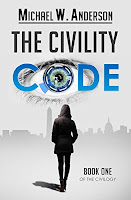 I won this near future, dystopian fiction through First Reads on Goodreads, as I do so many of the books I review here. The Civility Code by Michael W. Anderson is the first book of a trilogy.
I won this near future, dystopian fiction through First Reads on Goodreads, as I do so many of the books I review here. The Civility Code by Michael W. Anderson is the first book of a trilogy.The premise of the series is that offensive language has become a criminal offense, they added an amendment to the Constitution to this affect (Basically you are legally bound to be politically correct). To enforce this new law, a Civility Commission has been created. The commission investigates incidents of offensive language, prosecutes violators civilly and criminally, and determines what words are to be added to the prohibited word list each year. In the 20 years, since the law was enacted, 14,014 words have be added to the prohibited list. The list includes such words and phrases as: drunk driver, he, she, Mr., Miss, Mrs., clueless, fat, go on a diet, and not right.
The story follows the struggle between a group of hacktivists known as X and the Civility Commission over the law and the prohibited words. The hacktivists have been offered a window to take amnesty for their past crimes in order to escape prosecution, while the commissioner actively and passionately hunts them down.
The premise behind the book is what drew me to enter to win it, I think that the political correct/trigger warning movement has gotten out of control already and interferes with real discussions on serious issues. When I started the book, I had a hard time getting into it. The first chapter are so were difficult, I'm not sure if it was because of the new pronouns, the net shorthand used at the beginning, that I wasn't sure I was in the mood for the story, or the writing itself. After a couple of chapters, the story started to flow more smoothly for me. It seems the writing flowed better after that.
Anderson gives you insight into the personal lives and motivations of not only the hackers, but the commissioner of the Civility Commission. I look forward to to next volume to see how the stories and the characters progress.
Happy reading!


















